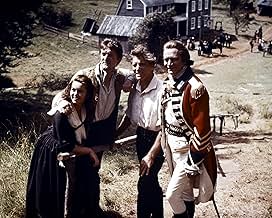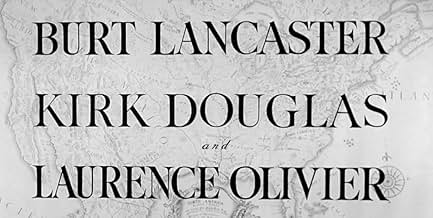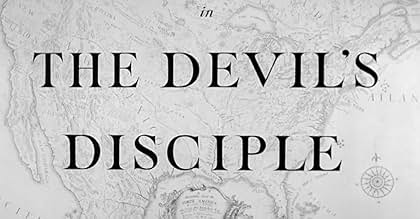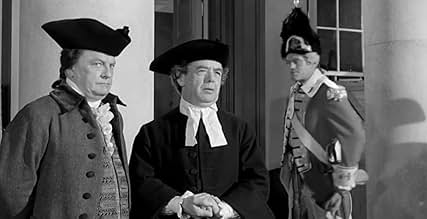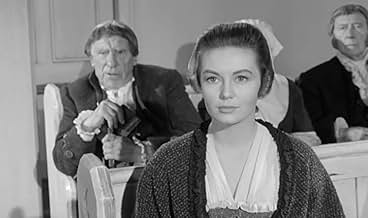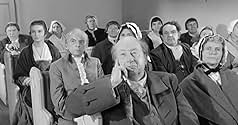NOTE IMDb
6,9/10
3,1 k
MA NOTE
Ajouter une intrigue dans votre langueThe black sheep of a family and the local minister discover their true vocations during the Revolutionary War.The black sheep of a family and the local minister discover their true vocations during the Revolutionary War.The black sheep of a family and the local minister discover their true vocations during the Revolutionary War.
- Réalisation
- Scénario
- Casting principal
- Nomination aux 1 BAFTA Award
- 1 nomination au total
Neil McCallum
- Christie Dudgeon
- (as Neil Mc Callum)
Joe Beckett
- British Officer
- (non crédité)
Steven Berkoff
- British Corporal
- (non crédité)
Avis à la une
"The Devil's Disciple" is based on a play by George Bernard Shaw. It recalls of a page in the history of the American Revolution. The play and this film interject considerable humor and satire in otherwise serious matters of the time. All of the cast are good in their roles.
Burt Lancaster is the Rev. Anthony Anderson. Kirk Douglas is a rogue patriot, Richard Dudgeon. Laurence Olivier is the epitome of the arrogant and unbending British general, Burgoyne. Janette Scot plays Anthony's wife, Judith Anderson. She's a conflicted woman after she meets Dudgeon. She loves her husband but also falls for Dudgeon, in his adventurous ways. But two can play at that, as she find outs with Anthony at the end of the film. Harry Andrews flourishes in yet another of his fine British uniform portrayals.
The story takes place in the days of leading up to and the start of the American Revolution. Shaw's sarcasm and cynical treatment of some of the beliefs of the time underlie the story. The film isn't exceptional, but Lancaster's production company pulled together a stellar cast for this humorous look at history and poking fun through the pen of G.B. Shaw.
This is the third film that Lancaster and Douglas made together. Most movie buffs should find the film amusing.
Burt Lancaster is the Rev. Anthony Anderson. Kirk Douglas is a rogue patriot, Richard Dudgeon. Laurence Olivier is the epitome of the arrogant and unbending British general, Burgoyne. Janette Scot plays Anthony's wife, Judith Anderson. She's a conflicted woman after she meets Dudgeon. She loves her husband but also falls for Dudgeon, in his adventurous ways. But two can play at that, as she find outs with Anthony at the end of the film. Harry Andrews flourishes in yet another of his fine British uniform portrayals.
The story takes place in the days of leading up to and the start of the American Revolution. Shaw's sarcasm and cynical treatment of some of the beliefs of the time underlie the story. The film isn't exceptional, but Lancaster's production company pulled together a stellar cast for this humorous look at history and poking fun through the pen of G.B. Shaw.
This is the third film that Lancaster and Douglas made together. Most movie buffs should find the film amusing.
Lancaster and Douglas had a rare and unique Hollywood relationship. Though they could easily have been rivals (and in some ways were), they formed a sort of onscreen "buddy team", working together many times and using their own traits of one-upmanship to lift various projects to a high level of achievement. Their competitiveness, paired with their mutual respect, led to some memorable movies. This is a lesser-known effort of theirs, but is, by no means, an inferior one. Lancaster is a gentle Revolutionary War-era minister, married to the lovely, but puritanical Scott. When the war reaches a fever pitch and local townsfolk begin to hang from the gallows, a roguish prodigal son (Douglas) returns to stir things up. Douglas and Lancaster form an uneasy alliance with each other until Douglas is arrested, mistaken for Lancaster who has buried a "rebel" without permission. The commanding British officer is Olivier, who knows that the war is hopeless, but continues to play it out with a sort of bemused detachment. Though the film contains a fair amount of action, it is really a witty, clever parade of words and thoughts (based on a George Bernard Shaw play) shedding a humorous and ironic light on a page in U.S. history. Lancaster is mellow for much of the film, but effective (and tan! The audience gets to see his muscular back in the film, though Scott is too demure to look upon it herself!) Douglas starts off VERY big, with distractingly dark and satanically groomed eyebrows. Fortunately, he overcomes this gimmick and turns in a solid performance. Olivier is very good, but doesn't really take the reigns of his role to the highest level (and has limited screen time in any case.) Andrews gives a very nice supporting turn as his exasperated right-hand man. Scott does some of her best work as the straight-laced bride who can't help but find herself drawn to the rough-hewn charms of Douglas, though the very idea tortures her. Her best moment comes when Douglas asks her to kiss him and she exclaims, "I can't!" (yet immediately thrusts herself onto him for a lengthy smooch!) As history, the film is dubious at best (and even recognizes this itself!), but, at a tight 83 minutes, it's a delightful diversion featuring a great combination of actors and stars. It doesn't overstay its welcome and has a light touch throughout. (Oh, and check out the stop-motion figures that show up during the voice-over narration! What a hoot!)
Burt Lancaster and Kirk Douglas shared a chemistry -- offscreen as well as on screen -- which was rare even by Hollywood standards. There's a legend about them, as a matter of fact (and I'd hate to think it apocryphal), that -- at the onset of each of the many films in which they co-starred -- they flipped a coin to see who would play which role.
In their film adaptation of George Bernard Shaw's "The Devil's Disciple," the coin-flip would have been at best symbolic -- or perhaps ironic is the term here -- inasmuch as the plotline concerns role reversals and identity switching. Set during the closing days of the American revolution, Dick Dudgeon, the town rakehell (Douglas), having previously admitted to Reverend Anderson, the local minister (Lancaster), "Pastor, there's something about you I respect, and that makes me want you for my enemy," allows himself to be mistakenly arrested as that minister by British troops. It's an act which even he, at the time, is at a loss to explain. While Dudgeon keeps the local British commandant, General Burgoyne (Laurence Olivier in what turns out to be one of his finer screen performances), alternately amused and bemused, Reverend Anderson discovers within himself a call to action as he rallies the rebel troops to rescue Dudgeon and to cut off Burgoyne's reinforcements.
Purists may note that the film adaptation tampers with Shaw's more typically cynical resolution in the original stage presentation (yes, it is much more 'upbeat' and true to the Hollywood dicta of the day) . . . and yet the Shavian quality of the dialogue between Dudgeon and Anderson -- not to mention the barbed repartee between Dudgeon and Burgoyne -- is preserved virtually intact here. It is also brilliantly rendered by all parties.
Although Douglas manages to 'steal' much of this film, Lancaster affords us more than a glimpse of the ability which will, in little more than another year, garner him an Oscar -- for 'Elmer Gantry'-- (and put an end to the yearly ritual of his and Douglas' comedic "It's So Great Not To Be Nominated" performance at the awards ceremonies).
One of Hollywood's more successful adaptations of a stage play, this is also a film which, more than most, stands the test of time.
In their film adaptation of George Bernard Shaw's "The Devil's Disciple," the coin-flip would have been at best symbolic -- or perhaps ironic is the term here -- inasmuch as the plotline concerns role reversals and identity switching. Set during the closing days of the American revolution, Dick Dudgeon, the town rakehell (Douglas), having previously admitted to Reverend Anderson, the local minister (Lancaster), "Pastor, there's something about you I respect, and that makes me want you for my enemy," allows himself to be mistakenly arrested as that minister by British troops. It's an act which even he, at the time, is at a loss to explain. While Dudgeon keeps the local British commandant, General Burgoyne (Laurence Olivier in what turns out to be one of his finer screen performances), alternately amused and bemused, Reverend Anderson discovers within himself a call to action as he rallies the rebel troops to rescue Dudgeon and to cut off Burgoyne's reinforcements.
Purists may note that the film adaptation tampers with Shaw's more typically cynical resolution in the original stage presentation (yes, it is much more 'upbeat' and true to the Hollywood dicta of the day) . . . and yet the Shavian quality of the dialogue between Dudgeon and Anderson -- not to mention the barbed repartee between Dudgeon and Burgoyne -- is preserved virtually intact here. It is also brilliantly rendered by all parties.
Although Douglas manages to 'steal' much of this film, Lancaster affords us more than a glimpse of the ability which will, in little more than another year, garner him an Oscar -- for 'Elmer Gantry'-- (and put an end to the yearly ritual of his and Douglas' comedic "It's So Great Not To Be Nominated" performance at the awards ceremonies).
One of Hollywood's more successful adaptations of a stage play, this is also a film which, more than most, stands the test of time.
There is little point denying that the greatest dramatist in England in the 20th Century was George Bernard Shaw. He was a great wit, and he had a view of society that he felt needed expressing in one play after another. But there was something irritating about him that has prevented him from overtaking Shakespeare in drama writing: His desire to give his views on this societal problem or that one led to polemics taking over his writings, so that the plays, even when good, can be uneven. He also displayed a monstrous ego at times that did not deserve to be admired or applauded by the public for most of his ninety three or four years.
In 1897 he had only a handful of plays that had been produced to show his talents: WIDOWERS HOUSE and MRS. WARREN'S PROFESSION were the best of these, and the second had been banned by the Lord Chamberlain's office for treating the subject of prostitution as a business. He decided to do a play with one of London's leading actor managers of the time: Mr. William Terris. But while negotiating with Terris to appear in this play. a madman stabbed Terris to death. Looking around for another actor, Shaw contacted Mr. Richard Mansfield, thus beginning a brief business relationship with that stage star. Mansfield produced THE DEVIL'S DESCIPLE in America, where it was a big success (Mansfield also played Dick Dudgeon).
Shaw was looking at good and evil in the play, with Dudgeon being an anti-religious type who was cynical. But Dudgeon demonstrates a sense of right and wrong and compassion that is missing from the other characters in the play, making the title very ironic - Dick may boast of worshiping the Devil, but he never hurts anyone. In the play, because of his fast life style, the local Puritanical townspeople (especially his mother) disapprove of him, and all but ostracize him. Then his father's will is read, and they realize he is rich (and the other heirs, especially his mother are poor). Since they are hypocrites, the lucky break for Dick makes them even more vicious toward him (his mother cursing him before she dies). So far so good for Shaw.
As I said, the play begins well, and continues fine - introducing high comedy when General Burgoyne appears. Burgoyne was a dramatist too, so Shaw liked him. And here the play (and movie's) problems begin to be felt. Shaw was writing the play in a period that the Whig historians, like George Otto Trevelyan, wrote the history of the American Revolution. Trevelyan's books became best sellers, and were well researched. But he wrote of the Revolution as the backdrop of English Revolutionary spirit as well. To Trevelyan, the English lost the war due to the ineptitude of the Tory regime of Lord North. One example of this was the story of how General Burgoyne's brilliant plan to split the northern colonies in half and conquer both halves one at a time was ruined when the Secretary of State for the Colonies, Lord George Germain, failed to send vital plans to General Sir William Howe to link his men with Burgoyne. Instead, Sir William headed for Philadelphia, which he occupied, and heard nothing about Burgoyne until the latter surrendered in October 1777.
The play builds up to a comic misunderstanding between the British and Dudgeon, whom they arrest thinking he is the Reverend - Dick was alone with the wife of the Reverend at the time, and assumes the latter's personality because he does not want a scandal to break out. Soon the Reverend (who supports the Revolution) faces a court martial, with the whimsical Gentleman Johnny asking questions. Although the result is a foregone conclusion, (the British have already hanged Dick's father as the movie begins), Burgoyne is annoyed to discover after the verdict is about to be given that Dick is not the Reverend.
This is all in the film, and it still works, especially with Olivier's perfect performance as the British general, who is facing defeat but won't lose his cool about it. But Shaw's source, George Otto Treveylan, is no longer supported by students of history - he is regarded as a Whig who ignored the many errors of his own party, to concentrate on the failures of Lord North and his Tories. One mistake is the story of Lord George Germain's failure to send Sir William Howe his plans, because Lord George felt he had to go on his personal vacation to the country, and would not wait to send out those vital plans. It is not true, after all. Lord George did send Sir William the plans, but Howe ignored them, going out to capture Philadelphia instead.
"History will lie as usual" says Burgoyne to Major Swindon. Ironically, Shaw pushed the lie as truth himself. Now everyone who sees the play or film believes that Lord George Germain's vacation plans lost the Revolution. Not really. The forests of upper New York State, the lack of good roads, the immense supply train played vital, the vigor of Benedict Arnold as an American general led to Burgoyne's surrender. But that was not as amusing as Lord George Germain's "failure" to send the vital plans. One recalls the end of John Ford's LIBERTY VALANCE: When given a chance to print the truth of the legend, print the legend!
In 1897 he had only a handful of plays that had been produced to show his talents: WIDOWERS HOUSE and MRS. WARREN'S PROFESSION were the best of these, and the second had been banned by the Lord Chamberlain's office for treating the subject of prostitution as a business. He decided to do a play with one of London's leading actor managers of the time: Mr. William Terris. But while negotiating with Terris to appear in this play. a madman stabbed Terris to death. Looking around for another actor, Shaw contacted Mr. Richard Mansfield, thus beginning a brief business relationship with that stage star. Mansfield produced THE DEVIL'S DESCIPLE in America, where it was a big success (Mansfield also played Dick Dudgeon).
Shaw was looking at good and evil in the play, with Dudgeon being an anti-religious type who was cynical. But Dudgeon demonstrates a sense of right and wrong and compassion that is missing from the other characters in the play, making the title very ironic - Dick may boast of worshiping the Devil, but he never hurts anyone. In the play, because of his fast life style, the local Puritanical townspeople (especially his mother) disapprove of him, and all but ostracize him. Then his father's will is read, and they realize he is rich (and the other heirs, especially his mother are poor). Since they are hypocrites, the lucky break for Dick makes them even more vicious toward him (his mother cursing him before she dies). So far so good for Shaw.
As I said, the play begins well, and continues fine - introducing high comedy when General Burgoyne appears. Burgoyne was a dramatist too, so Shaw liked him. And here the play (and movie's) problems begin to be felt. Shaw was writing the play in a period that the Whig historians, like George Otto Trevelyan, wrote the history of the American Revolution. Trevelyan's books became best sellers, and were well researched. But he wrote of the Revolution as the backdrop of English Revolutionary spirit as well. To Trevelyan, the English lost the war due to the ineptitude of the Tory regime of Lord North. One example of this was the story of how General Burgoyne's brilliant plan to split the northern colonies in half and conquer both halves one at a time was ruined when the Secretary of State for the Colonies, Lord George Germain, failed to send vital plans to General Sir William Howe to link his men with Burgoyne. Instead, Sir William headed for Philadelphia, which he occupied, and heard nothing about Burgoyne until the latter surrendered in October 1777.
The play builds up to a comic misunderstanding between the British and Dudgeon, whom they arrest thinking he is the Reverend - Dick was alone with the wife of the Reverend at the time, and assumes the latter's personality because he does not want a scandal to break out. Soon the Reverend (who supports the Revolution) faces a court martial, with the whimsical Gentleman Johnny asking questions. Although the result is a foregone conclusion, (the British have already hanged Dick's father as the movie begins), Burgoyne is annoyed to discover after the verdict is about to be given that Dick is not the Reverend.
This is all in the film, and it still works, especially with Olivier's perfect performance as the British general, who is facing defeat but won't lose his cool about it. But Shaw's source, George Otto Treveylan, is no longer supported by students of history - he is regarded as a Whig who ignored the many errors of his own party, to concentrate on the failures of Lord North and his Tories. One mistake is the story of Lord George Germain's failure to send Sir William Howe his plans, because Lord George felt he had to go on his personal vacation to the country, and would not wait to send out those vital plans. It is not true, after all. Lord George did send Sir William the plans, but Howe ignored them, going out to capture Philadelphia instead.
"History will lie as usual" says Burgoyne to Major Swindon. Ironically, Shaw pushed the lie as truth himself. Now everyone who sees the play or film believes that Lord George Germain's vacation plans lost the Revolution. Not really. The forests of upper New York State, the lack of good roads, the immense supply train played vital, the vigor of Benedict Arnold as an American general led to Burgoyne's surrender. But that was not as amusing as Lord George Germain's "failure" to send the vital plans. One recalls the end of John Ford's LIBERTY VALANCE: When given a chance to print the truth of the legend, print the legend!
Having seen The Devil's Disciple on a venue that runs films which have fallen into the public domain, I wonder how anyone could have let copyright lapse on such an intriguing, yet quirky, film as this. With it's triumvirate of strong leading men, and an interesting script, this movie should be much more well known. And with it's rather oddball presentation it's surprising that it does not have cult status.
The live action segments are excellent, and there is no slack in the acting or direction. However, some poor soul made the bizarre decision to interject little Rankin-Bass type puppet animation segments at nearly random moments, thoroughly negating - each time - all the dramatic momentum that has been accumulated up to that point. The animated segments are well done, and moderately amusing in and of themselves, yet completely incongruous to the tone of the surrounding film.
These segments are, however, a minor flaw when compared with the greatest drawback of this movie. I am referring to the character of Judith Anderson, our hero's wife. She is, without a doubt, the most annoyingly fickle and foolish female character that I can recall having ever witnessed in any film; and very nearly the most hysterical as well. Not too far into the story I began to get the feeling that I would very much like to slap her. Halfway through the film I was consciously rooting for each of the male leads to take a turn slapping her. By the end of the film I was convinced that everyone in the film should have slapped her, and probably the crew as well! The only thing that made this character bearable was the calm, good-natured presence of Lancaster, Douglas, and Olivier.
Now, this is not intended to denigrate Miss Janette Scott, who portrayed Mrs. Anderson. On the contrary, she did a remarkable job of making this over-the-top hysterical woman seem real. A lesser actress might have easily come off as overly melodramatic and phony in such an extreme performance. Her skill in the performance is the reason that we want to slap her. Kudos to Janette Scott. It is my opinion that almost everyone who watches this film will, in fact, want to slap her. Be prepared.
The live action segments are excellent, and there is no slack in the acting or direction. However, some poor soul made the bizarre decision to interject little Rankin-Bass type puppet animation segments at nearly random moments, thoroughly negating - each time - all the dramatic momentum that has been accumulated up to that point. The animated segments are well done, and moderately amusing in and of themselves, yet completely incongruous to the tone of the surrounding film.
These segments are, however, a minor flaw when compared with the greatest drawback of this movie. I am referring to the character of Judith Anderson, our hero's wife. She is, without a doubt, the most annoyingly fickle and foolish female character that I can recall having ever witnessed in any film; and very nearly the most hysterical as well. Not too far into the story I began to get the feeling that I would very much like to slap her. Halfway through the film I was consciously rooting for each of the male leads to take a turn slapping her. By the end of the film I was convinced that everyone in the film should have slapped her, and probably the crew as well! The only thing that made this character bearable was the calm, good-natured presence of Lancaster, Douglas, and Olivier.
Now, this is not intended to denigrate Miss Janette Scott, who portrayed Mrs. Anderson. On the contrary, she did a remarkable job of making this over-the-top hysterical woman seem real. A lesser actress might have easily come off as overly melodramatic and phony in such an extreme performance. Her skill in the performance is the reason that we want to slap her. Kudos to Janette Scott. It is my opinion that almost everyone who watches this film will, in fact, want to slap her. Be prepared.
Le saviez-vous
- AnecdotesThe character of The Reverend Anthony Anderson was loosely based on the historical figure of Peter Muhlenberg, known as the "Fighting Parson of the American Revolution".
- GaffesSeveral times while going through the forest, the British refer to "snipers." However, the term sniper didn't come into being until about 40 years after the American Revolutionary War. The term came into usage in 1824, while the war ended in 1783.
- Citations
Major Swindon: What will history say, sir?
General John Burgoyne: History, sir, will tell lies, as usual!
- Crédits fousThe opening credits appear over a map of North America during the Revolutionary War, which then zooms into an animated battle played out by paper models.
- ConnexionsReferenced in Un numéro du tonnerre (1960)
- Bandes originalesYankee Doodle
(uncredited)
traditional 18th Century Anglo-American folk song
Heard under main title
Meilleurs choix
Connectez-vous pour évaluer et suivre la liste de favoris afin de recevoir des recommandations personnalisées
- How long is The Devil's Disciple?Alimenté par Alexa
Détails
- Date de sortie
- Pays d’origine
- Langue
- Aussi connu sous le nom de
- Le Disciple du diable
- Lieux de tournage
- Sociétés de production
- Voir plus de crédits d'entreprise sur IMDbPro
Box-office
- Budget
- 1 500 000 $US (estimé)
- Durée1 heure 23 minutes
- Couleur
- Rapport de forme
- 1.85 : 1
Contribuer à cette page
Suggérer une modification ou ajouter du contenu manquant

Lacune principale
By what name was Au fil de l'épée (1959) officially released in India in English?
Répondre

